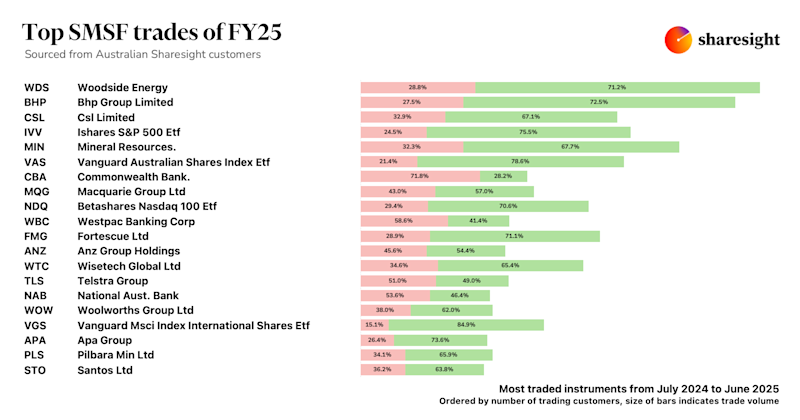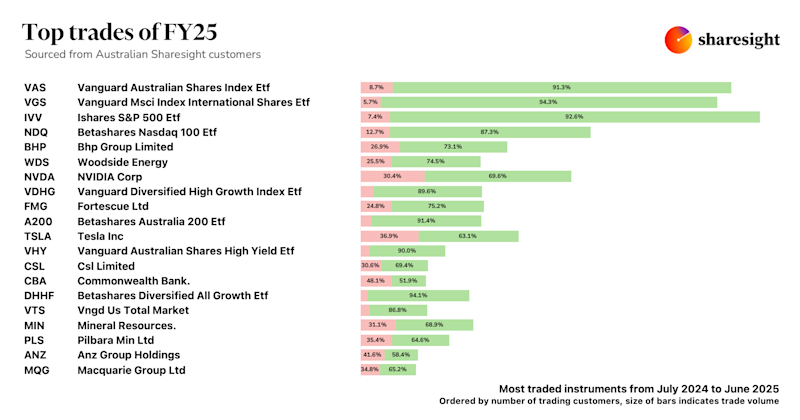How I use Sharesight as an investor
As a keen DIY investor, I was attracted to Sharesight (as a user, and now, investor) by its clear and powerful functionality, and its focus on investors alike, who want to take control of their investments and save on the costs of investing, but who also have better things to do with their time than track down missing dividend payments.
I use Sharesight personally every day and I can truly say it has transformed my investing experience. I have gained great insight into how I am performing and saved many thousands of dollars in fees over time from the way I used to manage my investments.
Here are some of my suggestions to get the most out of Sharesight:

Import ALL of your holdings
It’s essential to get an accurate picture of your portfolio and your returns. It can be a bit of work at the beginning, but once set up it’s largely automated. I use the Trade Confirmation Emails feature for my Australian broker and it works very reliably. I also use a US broker which doesn’t send trade confirmation emails, but I can use the File Importer to import trades in bulk my Sharesight portfolio.

Not only do I track listed investments, but I also have some private unlisted investments (such as property) which I track as Custom Investments. I have to manually update the prices, but for my purposes that doesn’t need to be done very often. The custom investment feature is a really useful way of tracking all my investments in one place.
Benchmark your portfolio
Because I'm in Australia I track my investments against STW, which is an ETF covering the top 200 stocks on the ASX. However, if I wanted to compare my performance to a common US index tracking ETF I might benchmark against the SPDR S&P 500 ETF (NYSE: SPY), iShares Core S&P 500 ETF (NYSE: IVV) or the Nasdaq tracking Invesco QQQ (NASDAQ: QQQ).
Benchmarking your portfolio is vital so you can see how successful your stock picks and decisions are. Making a 10% return is good, but if the market went up 15% (and you could have achieved this return by buying a suitable ETF covering the market) then you need to think about how you can improve your performance going forward.

Set up some Custom Groups
I use this feature to track my returns by different asset classes. The beauty of Custom Groups is that you can organise your portfolio in a way that is meaningful to you rather than having to use predefined ones which often are not that relevant. Basically, I track my share portfolio using 5 groups:
-
Domestic active: These are domestic listed shares I pick myself and manage actively
-
Domestic passive: Passive ETFs that track a domestic stock market index
-
International Active: This is a mixture of international active managed funds and individual stocks that I pick
-
International passive: International ETFs that are tracking an index
-
Fixed interest: Bond funds primarily
With this grouping I can easily see how each area is performing and how it makes up my overall portfolio. I can see if my own stock picking is adding value, versus the index or a more passive investment approach. By running the Diversity Report I can also see the percentage in each category to make sure I am staying within sensible limits on each.
Learn how I use Sharesight in this webinar
For even more tips on how I use Sharesight as an investor watch this webinar recording where I walk you through how I get the most out of Sharesight.
Embedded content: https://www.youtube.com/embed/ar0gI5ew7pE
Get the most out of Sharesight
Getting the most out of Sharesight does require a bit of upfront commitment to import your portfolio data and understand how it all works. But I am confident you will get a great return on that investment of your time, plus with Sharesight you can:
-
Track all your investments in one place, including domestic and international stocks, mutual/managed funds, property, foreign currency and even cryptocurrency
-
Automatically track your daily price & currency fluctuations, as well as handle corporate actions such as dividends and share splits
-
Run powerful reports built for investors, including Performance, Portfolio Diversity, Contribution Analysis and Future Income (upcoming dividends)
-
Run tax reports including Taxable Income (dividends/distributions), Sold Seurities, Capital Gains Tax (Australia and Canada), Traders Tax (Capital Gains for traders in NZ) and FIF foreign investment fund income reports (NZ)
If you haven’t already signed up for Sharesight, you can do so here, it’s free to get started!
FURTHER READING

Sharesight users' top 20 trades – June 2025
Welcome to the June 2025 edition of Sharesight’s monthly trading snapshot, where we look at the top buy and sell trades by Sharesight users in all markets.

Top SMSF trades by Australian Sharesight users in FY24/25
Welcome to our annual Australian financial year trading snapshot for SMSFs, where we dive into this year’s top trades by Sharesight users.

Top trades by Australian Sharesight users in FY24/25
Welcome to the FY24/25 edition of our Australian trading snapshot, where we dive into this financial year’s top trades by Sharesight users.